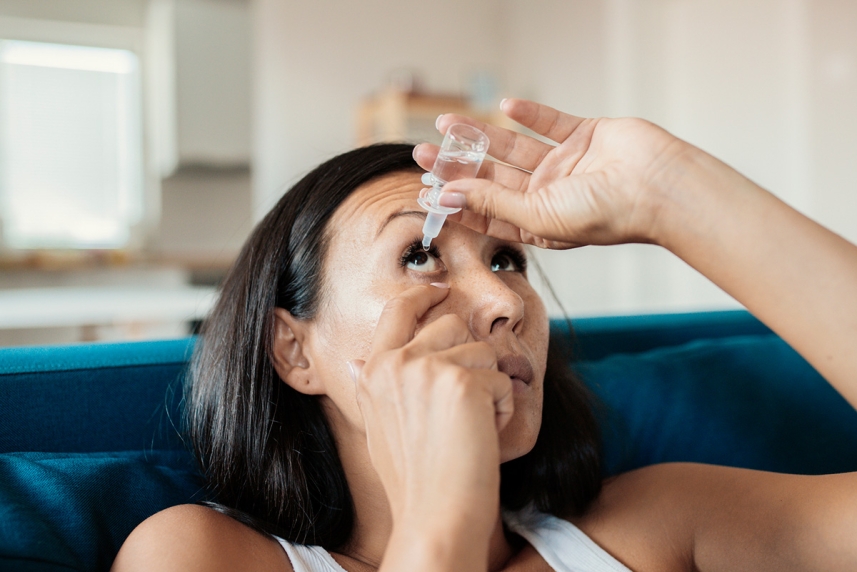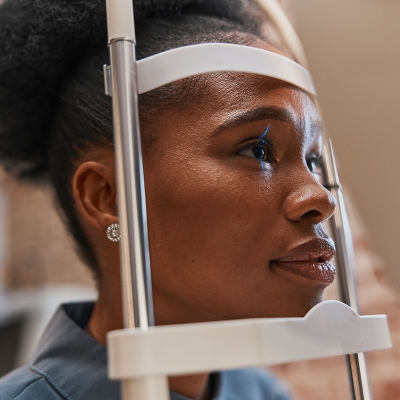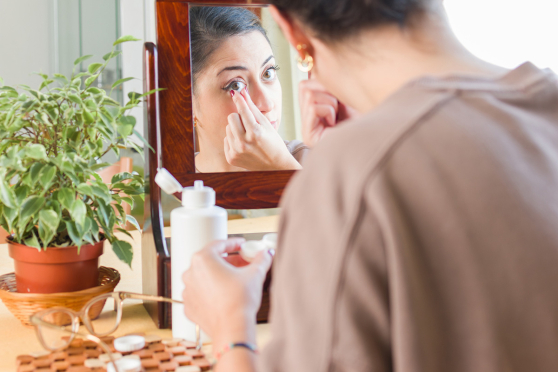Here’s what to know about eye allergies
People may experience irritation and other symptoms in their eyes. Learn how to treat them and get relief.

People might think of “allergy season” as only happening in the spring, when the flowers begin to bud and bloom, and pollen coats their cars. But people might be surprised to learn that they could experience allergy symptoms year-round.1
For people with eye allergies, allergy season may be particularly difficult. Eye allergies might leave the eyes red, scratchy and irritated. They may affect regular contact lens wearers in particular and potentially impact overall eye health.
Luckily, people don’t have to suffer their way through the year. They may manage their eye allergies both at home — with over-the-counter (OTC) medication — and with the help of an eye care provider. Here’s what to know.
Comfort is key when it comes to contacts. Find your new favorite contacts now — and save 10%.
What might cause eye allergies and their symptoms?
Any allergy, whether it be in the eye or elsewhere on the body, will be caused by the body’s reaction to a foreign substance.2 The body creates chemicals called histamines, and it’s these chemicals that cause an allergic reaction.
During allergy season, which could be any time of the year, the triggers that cause hay fever (aka allergic rhinitis), rashes and other allergic reactions may also cause eye allergies. These triggers include:1
- Budding trees
- Flowers
- Grasses
- Mold
Also, pet dander (dead skin cells), dust, smoke, some perfumes and even certain foods may lead to eye allergies.
Histamines are a natural part of the body’s defense system, which help it get rid of foreign substances. But these chemicals can build up in the eye and cause those not-so-pleasant symptoms.3 These might include:3
- Burning
- Itchiness
- Redness
- Sensitivity to light
- Swollen eyes
- Tearing
- Watery eyes
Eye allergies may also result in bumps forming on the upper and lower eyelids, making every blink uncomfortable, says Christopher W. Lievens, O.D. He’s the director of research at the Southern College of Optometry in Memphis, Tennessee. “You can see the bumps underneath the eyelid, called a ‘papillary reaction,’” he says. Every time the lid moves, it may cause further irritation because the bumps rub against the surface of the eye.
Symptoms may be particularly bad for people who wear contact lenses. That’s because contact lenses themselves may cause eye irritation, as can a protein from tears that binds to the surface of the lens. Additional symptoms from the ones listed above may include mucus discharge and lens discomfort.4
In rare cases, contact lens wearers may experience an allergy (i.e., giant papillary conjunctivitis) in which individual fluid sacs, or papules, form in the upper lining of the inner eyelid. Symptoms of this might include:4
- Blurred vision
- Foreign body sensation (the feeling that something may be rubbing against the eyes when they blink)
- Itching
- Mucus discharge
- Poor tolerance for wearing contact lenses
- Puffiness
6 dos and don’ts for treating eye allergies at home
A first line of defense for treating eye allergies might be trying (or avoiding) one or all of these 6 home strategies.
Do: Identify the itch.
Some people may be able to avoid the causes of their eye allergies by simply avoiding what’s causing them. This could include:
- Avoiding contact with particular animals or getting a hypoallergenic pet (one that’s less likely to cause allergies)
- Regularly dusting to minimize the presence of dust and pet dander around the house
- Stopping the use of certain types of perfumes, if they irritate the eyes
- Using an air purifier
Don’t: Rub the eyes.
Rubbing the eyes may make them itch more and speed up swelling, redness and histamine production, creating a vicious cycle. “The more we scratch, the redder it gets,” says Dr. Lievens.
Rubbing the eyes may also introduce more allergens into the eye, because if allergens are in the air, they may settle on the hands. The practice can also damage the cornea (the outermost part of the eye).5
Do: Try a cold compress.
Need some relief from those eye allergy symptoms? A damp cold compress might help ease them. It may also be a great (and safer) alternative to rubbing the eyes.5
Don’t: Take OTC oral allergy medicines.
Before someone reaches for those OTC oral allergy meds, it’s worth knowing that it might have the opposite effect on the eyes. “This is something most patients do not know,” says Dr. Lievens. “Unfortunately, everything you take over the counter — which does great work for the body in mitigating systemic allergies — can cause dryness.” Instead, he strongly recommends that people treat their allergies with topical eye drops.
Do: Choose brand-name eye drops.
As Dr. Lievens noted in the previous tip, eye drops may go a long way in relieving eyes that feel dry, itchy and scratchy. Check the local pharmacy for a range of options, such as preservative-free artificial tears. They help lubricate the eyes and keep the dryness and irritation at bay. Bonus: Cool the drops before applying them to the eyes.5
Don’t: Let cosmetics expire.
Allergic reactions from cosmetics or products used near the eyes are “a whole different topic,” notes Dr. Lievens. It’s a mistake he frequently sees patients make. “Mascara tubes become breeding grounds for all kinds of nasty bacteria. It’s pretty bad,” he says. He recommends replacing cosmetics regularly to help keep the eyes healthy, especially when allergies might be involved.
How might an eye care provider help?
People may not always be able to manage or relieve eye allergies at home. That’s where the expertise of an eye care provider may come in handy. They may be able to:
- Provide advice about eye drops. Not all drops are created equal, says Dr. Lievens. An eye care provider may recommend a quality version, as there may be differences between brands. Many have the same active ingredients, “but in the world of eye drops, oftentimes the inactive ingredients are the ‘special sauce,’” he says.
Branded products have special “carrier” ingredients that may make all the difference. “That’s the stuff that’s really going to treat the patient,” he says. So, while brand-name eye drops might be more expensive than other ones, they may provide better relief and be worth the expense.
- Write a prescription for eye drops. For long-term eye allergies, prescription steroid eye drops may be the best way to keep eye allergies and symptoms away, notes Dr. Lievens.
You should only use these drops under doctor supervision.
The bottom line: Eye allergies, which are often unpleasant and rarely dangerous, may be managed and treated. While OTC options may be plentiful, an eye care provider may be a person’s best bet. They may help diagnose and treat allergies and ensure optimal eye health.
Stay on top of your eye health with an in-network provider. Search for an eye care provider now.
Sources:
- Allergy season is here to stay Cleveland Clinic, March 2023.
- Allergies Mayo Clinic, August 2022.
- What are eye allergies? American Academy of Ophthalmology, September 2023.
- Eye allergy American College of Allergy, Asthma, & Immunology.
- The dangers of rubbing itchy eyes Cleveland Clinic, March 2024.


